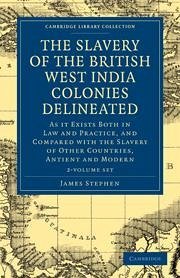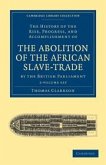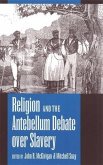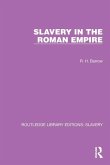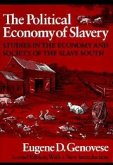James Stephen
The Slavery of the British West India Colonies Delineated 2 Volume Set
As It Exists Both in Law and Practice, and Compared with the Slavery of Other Countries, Antient and Modern
James Stephen
The Slavery of the British West India Colonies Delineated 2 Volume Set
As It Exists Both in Law and Practice, and Compared with the Slavery of Other Countries, Antient and Modern
- Broschiertes Buch
- Merkliste
- Auf die Merkliste
- Bewerten Bewerten
- Teilen
- Produkt teilen
- Produkterinnerung
- Produkterinnerung
A key abolitionist text, exposing the cruelty of colonial slave laws, by one of the nineteenth century's most brilliant lawyers.
Andere Kunden interessierten sich auch für
![The History of the Rise, Progress, and Accomplishment of the Abolition of the African Slave-Trade by the British Parliament 2 Volume Set The History of the Rise, Progress, and Accomplishment of the Abolition of the African Slave-Trade by the British Parliament 2 Volume Set]() Thomas ClarksonThe History of the Rise, Progress, and Accomplishment of the Abolition of the African Slave-Trade by the British Parliament 2 Volume Set165,99 €
Thomas ClarksonThe History of the Rise, Progress, and Accomplishment of the Abolition of the African Slave-Trade by the British Parliament 2 Volume Set165,99 €![Caribbean Slavery in the Atlantic World Caribbean Slavery in the Atlantic World]() Verene A ShepherdCaribbean Slavery in the Atlantic World90,99 €
Verene A ShepherdCaribbean Slavery in the Atlantic World90,99 €![The harem, slavery and British imperial culture The harem, slavery and British imperial culture]() Diane Robinson-DunnThe harem, slavery and British imperial culture33,99 €
Diane Robinson-DunnThe harem, slavery and British imperial culture33,99 €![Slave Society in the City Slave Society in the City]() Pedro L V WelchSlave Society in the City31,99 €
Pedro L V WelchSlave Society in the City31,99 €![Religion and the Antebellum Debate over Slavery Religion and the Antebellum Debate over Slavery]() Religion and the Antebellum Debate over Slavery43,99 €
Religion and the Antebellum Debate over Slavery43,99 €![Slavery in the Roman Empire Slavery in the Roman Empire]() R. H. BarrowSlavery in the Roman Empire53,99 €
R. H. BarrowSlavery in the Roman Empire53,99 €![The Political Economy of Slavery The Political Economy of Slavery]() Eugene D GenoveseThe Political Economy of Slavery33,99 €
Eugene D GenoveseThe Political Economy of Slavery33,99 €-
-
-
A key abolitionist text, exposing the cruelty of colonial slave laws, by one of the nineteenth century's most brilliant lawyers.
Hinweis: Dieser Artikel kann nur an eine deutsche Lieferadresse ausgeliefert werden.
Hinweis: Dieser Artikel kann nur an eine deutsche Lieferadresse ausgeliefert werden.
Produktdetails
- Produktdetails
- Verlag: Cambridge University Press
- Seitenzahl: 1062
- Erscheinungstermin: 30. September 2010
- Englisch
- Abmessung: 216mm x 140mm x 61mm
- Gewicht: 1361g
- ISBN-13: 9781108020848
- ISBN-10: 1108020844
- Artikelnr.: 32854217
- Herstellerkennzeichnung
- Libri GmbH
- Europaallee 1
- 36244 Bad Hersfeld
- gpsr@libri.de
- Verlag: Cambridge University Press
- Seitenzahl: 1062
- Erscheinungstermin: 30. September 2010
- Englisch
- Abmessung: 216mm x 140mm x 61mm
- Gewicht: 1361g
- ISBN-13: 9781108020848
- ISBN-10: 1108020844
- Artikelnr.: 32854217
- Herstellerkennzeichnung
- Libri GmbH
- Europaallee 1
- 36244 Bad Hersfeld
- gpsr@libri.de
Volume 1: Preface; Preliminary chapter; Book I. Of the Slavery of our
Colonies Considered as a Legal Institution: 1. Of the origin and authority
of the colonial slave laws in general; 2. Of the persons who are subject to
slavery in our colonies; 3. Of the legal nature and incidents of this
condition, as they respect and constitute the relation between the slave
and his master; 4. Of the legal nature and incidents of colonial slavery,
as they respect its relations to persons of free condition in general, the
master and his delegates excepted; 5. Of the legal nature and incidents of
West India slavery, in its relations to the police and civil government of
the country; 6. Of this state of slavery in respect of its commencement and
dissolution; Appendices. Volume 2: Preface; Book II. Delineation of the
State of Slavery in our Colonies, in its Ordinary Practical Nature and
Effects: 1. Reasons for resuming this work; 2. Of agricultural labour in
the torrid zone, and the pernicious effects of its excess when forcibly
exacted; 3. The high probability that the amount of forced labour on sugar
plantations is oppressively and destructively excessive, deduced from the
natural tendency of the system, and confirmed by the decline of population
among the predial slaves; 4. The actual ordinary details and general
amount, in point of time, of forced labour on sugar plantations
particularly stated and proved, and the cruel excess demonstrated; 5. The
labour shewn to be excessive also, for the most part, in point of
intensity, or the degree of actual exertion; 6. Comparison of the amount of
slave labour on sugar plantations with that of agricultural labourers in
England; 7. The means by which labour is enforced on sugar plantations
greatly aggravates its severity, and are in their nature and effects
extremely cruel and pernicious; 8. The maintenance of the plantation slaves
is in a very oppressive and cruel degree parsimonious and insufficient; 9.
The allowances of clothing to the field negroes by their owners is also in
a shameful degree penurious and insufficient; 10. The slaves are very badly
lodged; 11. The slaves are also treated with great harshness, neglect, and
inhumanity when sick; 12. The whole expense of the maintenance of
plantation slaves estimated and compared with the cost of free labour; 13.
Concluding and practical reflections; Appendices.
Colonies Considered as a Legal Institution: 1. Of the origin and authority
of the colonial slave laws in general; 2. Of the persons who are subject to
slavery in our colonies; 3. Of the legal nature and incidents of this
condition, as they respect and constitute the relation between the slave
and his master; 4. Of the legal nature and incidents of colonial slavery,
as they respect its relations to persons of free condition in general, the
master and his delegates excepted; 5. Of the legal nature and incidents of
West India slavery, in its relations to the police and civil government of
the country; 6. Of this state of slavery in respect of its commencement and
dissolution; Appendices. Volume 2: Preface; Book II. Delineation of the
State of Slavery in our Colonies, in its Ordinary Practical Nature and
Effects: 1. Reasons for resuming this work; 2. Of agricultural labour in
the torrid zone, and the pernicious effects of its excess when forcibly
exacted; 3. The high probability that the amount of forced labour on sugar
plantations is oppressively and destructively excessive, deduced from the
natural tendency of the system, and confirmed by the decline of population
among the predial slaves; 4. The actual ordinary details and general
amount, in point of time, of forced labour on sugar plantations
particularly stated and proved, and the cruel excess demonstrated; 5. The
labour shewn to be excessive also, for the most part, in point of
intensity, or the degree of actual exertion; 6. Comparison of the amount of
slave labour on sugar plantations with that of agricultural labourers in
England; 7. The means by which labour is enforced on sugar plantations
greatly aggravates its severity, and are in their nature and effects
extremely cruel and pernicious; 8. The maintenance of the plantation slaves
is in a very oppressive and cruel degree parsimonious and insufficient; 9.
The allowances of clothing to the field negroes by their owners is also in
a shameful degree penurious and insufficient; 10. The slaves are very badly
lodged; 11. The slaves are also treated with great harshness, neglect, and
inhumanity when sick; 12. The whole expense of the maintenance of
plantation slaves estimated and compared with the cost of free labour; 13.
Concluding and practical reflections; Appendices.
Volume 1: Preface; Preliminary chapter; Book I. Of the Slavery of our
Colonies Considered as a Legal Institution: 1. Of the origin and authority
of the colonial slave laws in general; 2. Of the persons who are subject to
slavery in our colonies; 3. Of the legal nature and incidents of this
condition, as they respect and constitute the relation between the slave
and his master; 4. Of the legal nature and incidents of colonial slavery,
as they respect its relations to persons of free condition in general, the
master and his delegates excepted; 5. Of the legal nature and incidents of
West India slavery, in its relations to the police and civil government of
the country; 6. Of this state of slavery in respect of its commencement and
dissolution; Appendices. Volume 2: Preface; Book II. Delineation of the
State of Slavery in our Colonies, in its Ordinary Practical Nature and
Effects: 1. Reasons for resuming this work; 2. Of agricultural labour in
the torrid zone, and the pernicious effects of its excess when forcibly
exacted; 3. The high probability that the amount of forced labour on sugar
plantations is oppressively and destructively excessive, deduced from the
natural tendency of the system, and confirmed by the decline of population
among the predial slaves; 4. The actual ordinary details and general
amount, in point of time, of forced labour on sugar plantations
particularly stated and proved, and the cruel excess demonstrated; 5. The
labour shewn to be excessive also, for the most part, in point of
intensity, or the degree of actual exertion; 6. Comparison of the amount of
slave labour on sugar plantations with that of agricultural labourers in
England; 7. The means by which labour is enforced on sugar plantations
greatly aggravates its severity, and are in their nature and effects
extremely cruel and pernicious; 8. The maintenance of the plantation slaves
is in a very oppressive and cruel degree parsimonious and insufficient; 9.
The allowances of clothing to the field negroes by their owners is also in
a shameful degree penurious and insufficient; 10. The slaves are very badly
lodged; 11. The slaves are also treated with great harshness, neglect, and
inhumanity when sick; 12. The whole expense of the maintenance of
plantation slaves estimated and compared with the cost of free labour; 13.
Concluding and practical reflections; Appendices.
Colonies Considered as a Legal Institution: 1. Of the origin and authority
of the colonial slave laws in general; 2. Of the persons who are subject to
slavery in our colonies; 3. Of the legal nature and incidents of this
condition, as they respect and constitute the relation between the slave
and his master; 4. Of the legal nature and incidents of colonial slavery,
as they respect its relations to persons of free condition in general, the
master and his delegates excepted; 5. Of the legal nature and incidents of
West India slavery, in its relations to the police and civil government of
the country; 6. Of this state of slavery in respect of its commencement and
dissolution; Appendices. Volume 2: Preface; Book II. Delineation of the
State of Slavery in our Colonies, in its Ordinary Practical Nature and
Effects: 1. Reasons for resuming this work; 2. Of agricultural labour in
the torrid zone, and the pernicious effects of its excess when forcibly
exacted; 3. The high probability that the amount of forced labour on sugar
plantations is oppressively and destructively excessive, deduced from the
natural tendency of the system, and confirmed by the decline of population
among the predial slaves; 4. The actual ordinary details and general
amount, in point of time, of forced labour on sugar plantations
particularly stated and proved, and the cruel excess demonstrated; 5. The
labour shewn to be excessive also, for the most part, in point of
intensity, or the degree of actual exertion; 6. Comparison of the amount of
slave labour on sugar plantations with that of agricultural labourers in
England; 7. The means by which labour is enforced on sugar plantations
greatly aggravates its severity, and are in their nature and effects
extremely cruel and pernicious; 8. The maintenance of the plantation slaves
is in a very oppressive and cruel degree parsimonious and insufficient; 9.
The allowances of clothing to the field negroes by their owners is also in
a shameful degree penurious and insufficient; 10. The slaves are very badly
lodged; 11. The slaves are also treated with great harshness, neglect, and
inhumanity when sick; 12. The whole expense of the maintenance of
plantation slaves estimated and compared with the cost of free labour; 13.
Concluding and practical reflections; Appendices.

